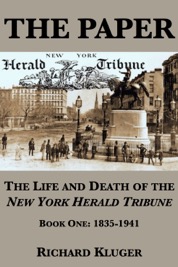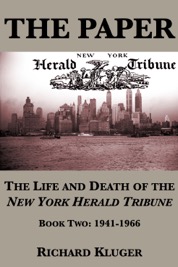 . . .
. . . 
$9.99 on Kindle, Nook,. . . .$9.99 on Kindle, Nook,
Apple Books, Kobo,. .. . . . .Apple Books, Kobo,
Google Play ………….………… . Google Play
Click here for both eBooks on Kindle
The Paper: The Life and Death of the New York Herald Tribune by Richard Kluger (393,000 words, 54 illustrations); eBook 1 covers the years 1835-1941; eBook 2 covers 1941-1966.
Few American newspapers, perhaps none, have matched the New York Herald Tribune in the crispness of its writing and editing, the bite of its commentators, the range of its coverage and the clarity of its typography. The “Trib”, as it was affectionately called, raised newspapering to an art form. It had an influence and importance out of all proportion to its circulation. During the Civil War, Abraham Lincoln went to great lengths to retain the support of its co-founder, Horace Greeley. President Eisenhower felt it was such an important institution and Republican organ that he helped broker its sale to its last owner, multimillionaire John Hay Whitney.
The Trib’s spectacularly distinguished staffers and contributors included Karl Marx, Tom Wolfe, Walter Lippmann, Dorothy Thompson, Virgil Thomson, Eugenia Sheppard, Red Smith, Heywood Broun, Walter Kerr, Homer Bigart, and brothers Joseph and Stewart Alsop. At the close of World War II, the Herald Tribune, the marriage of two newspapers that had done more than any others to create modern daily journalism, was at its apex of power and prestige. Yet just twenty-one years later, its influence still palpable in every newsroom across the nation, the Trib was gone.
This is the story The Paper, a 1986 finalist of the National Book Award for Nonfiction and winner of the George Polk Prize, tells.
“Probably the best book ever written about an American newspaper. But it is more than that — a brilliant piece of social history that recounts in vivid and telling detail the changing conception of ‘news’ in America... The book is chockablock with marvelous yarns... And what a cast of characters Kluger has to work with... Some of the most vivid pages in The Paper are Kluger’s portraits of these arresting personalities.” — J. Anthony Lukas, The Boston Globe
“Monumental... with a narrative sweep that is always absorbing and sometimes breathtaking... What invigorates this history is Mr. Kluger’s enthusiasm for his subject, which is apparent everywhere in the loving detail with which he tells the story... and in the liveliness of the prose with which he profiles some of the Tribune’s more unusual personalities.” — Christopher Lehmann-Haupt, The New York Times
“Engrossing... if there is a better book about an American newspaper, I am unaware of it... It is loaded to the gunnels with newspaper anecdotes, but at its core The Paper is a book about the relationship between the press and the powerful, the press and the wealthy.” — Jonathan Yardley, Washington Post Book World
“The romance of The Front Page, genteel anti-Semitism, the disaster of newspaper labor relations, and the rise and fall of newspaper fortunes. All are there in The Paper. It is irresistible.” — Anthony Lewis
“Compelling... most delightfully so when Mr. Kluger is limning the words and deeds of the people who made The Paper crackle with vitality for more than a century... He does a remarkable job of bringing these people to life on the printed page.” — David Shaw, The New York Times Book Review
“Remarkable... a fascinating account of a greatness that once was... This book will hold you in its narrative grip as you revel in a story of a grand venture and epic characters... Here the history of a newspaper is a graphic presentation of a nation’s life.” — Kirkus Reviews
“Richard Kluger is uniquely qualified to tell this tale... He brings a novelist’s imagination to some vivid material.” — Paul Gray, Time Magazine
“Fascinating from start to finish, the best book about American journalism since Swanberg’s Citizen Hearst. Huge and engrossing.” — Larry Lee, San Francisco Chronicle
“A magnificently romantic history not only of the ill-fated New York Herald Tribune but of New York newspapering generally... peopled with unforgettable heroes and knaves.” — Robert Sherrill, Chicago Sun-Times
“Kluger’s book [reminds us] that any history of American newspapers is also a history of American life... His research is prodigious... The Paper is a brilliant achievement in its thoroughness and its warmth.” — William Zinsser, Columbia Journalism Review
“To read The Paper is to travel the Herald Tribune as one does the Titanic on its ill-fated journey, or witness the inexorable death of Willy Loman, salesman. There have been dynamic portraits of publishers and yeasty yarns about journalists, but no single book has captured the organic interaction between the boardroom and the newsroom as has this classic by Richard Kluger.” — Fred W. Friendly, producer of Edward R. Murrow’s TV news reports
This “smashing new history... is recommended reading for every newspaper buff.” — Liz Smith, New York Daily News
“A solid, vivid biography of one of this country’s finest newspapers... The author, who was the Tribune’s literary editor from 1963 to 1966, allows himself enough elbow-room... to give a lively account of... the workings of the paper as a commercial and journalistic undertaking and to furnish portrait sketches of the men and women who got the paper out.” — The New Yorker
“In meticulously documenting the rise and fall of the Trib and the affairs of the day that it reported, interpreted and helped shape, Kluger really has chronicled the development of the modern American newspaper... The Trib almost never was boring, and Kluger’s book definitely does the standards and traditions of that late, lamented journal proud.” — Marc Shogol, Philadelphia Enquirer
“A prodigious and candid book. In writing The Paper, [Kluger] has done an even more awesome job of research [than in Simple Justice]... Few papers have accumulated such rich lore and legendry, compiled such an innovative journalistic record, or presented such an array of talented and creative writers and editors. Some unforgettable names find their due in these pages...” — Herbert Kupferberg, Newsday
“A splendidly written and masterly history... the finest book about newspapers in the 17 years since the publication of Gay Talese’s... The Kingdom and the Power... which Mr. Kluger’s book certainly equals and often surpasses... He is astonishingly adept at recreating the working atmosphere in which the Herald Tribune was produced and in breathing life into the personalities... who put it together.” — Neil A. Grauer, Baltimore Sun
“What Kluger has done is to write one of the two great books about a newspaper, the other being The Kingdom and the Power, the 1969 study by Gay Talese of The New York Times... One of the things that makes Kluger’s book preferable is that he goes into every aspect of newspaper life... areas that are seldom touched in books about newspapers... Kluger’s portraiture is excellent.” — Roger Harris, Newark Star-Ledger
“It is Richard Kluger’s contention that ‘the Tribune was not inferior to the Times — only less successful.’ He argues very convincingly on behalf of that premise. His is a thorough and sensitive study; and as befits the subject and his own Herald Tribune pedigree — he was the paper’s literary editor from 1962 to 1966 — it is also brilliantly written.” — Charles Fountain, Christian Science Monitor
“The book’s fine scholarship glows behind its gutsy writing and wonderful cast of characters. This tale of the Tribune’s fateful crisis is a grade-A journalistic cliffhanger.” — W.A. Swanberg, Chicago Tribune
“Kluger... has performed a vast labor of love and research on 131 years of Herald Tribune history, written with verve, style and skill. [But] this is not just a book of nostalgic fluff for old newspaper buffs. It is an absorbing, serious, and colorful picture of social, political and journalistic life in an era when newspapers across America were family businesses, and reporters... were the television of the times... In Kluger’s warm, witty, wonderful obituary, the Trib still lives.” — Don Cook, Los Angeles Times
“Not for money and not for honor are books like Richard Kluger’s The Paper written. They are written for higher purpose: sometimes to right a wrong, to grieve a tragedy or to celebrate a truth endangered or lost. Books like The Paper are written for moral purposes... His Simple Justice (1976) is the essential book on the Supreme Court’s decision outlawing racial segregation in our public schools. In a less grave voice here, Kluger invests The Paper with no less depth of feeling, literary grace or zeal to get the story full and right.” — Webster Schott, Cleveland Plain Dealer
“Kluger’s deeply researched book is not so much an obituary... as it is a celebration of an institution that once lived... This is a rollicking, readable book for all its bulk... All who care about journalism should read this book.” — John Miller, Toronto Star
“A cautionary tale about the way too much money — and too little business knowledge — can destroy an organization’s ability to fulfill its public trust... Any businessperson can learn from this readable tale. The writing is clear, evocative, and evenhanded. It would have made the imperious old Herald Tribune editors proud.” — Ronald Varney, Harvard Business Review
“The story... of what many students of the subject regard as the best newspaper in the history of American journalism... is told in a monumental work by Richard Kluger, the last literary editor of the Tribune. Combining graceful narrative with exhaustive research, Kluger has produced the best nonfiction book of the year.” — John Swagerty, Arizona Republic
“Kluger presents a truly fascinating account, one that does much with the history of American journalism in general. If his volume is a bit on the hefty side... it is as lively as it is learned. Just as important, it is written with dedication to an enterprise in which everyone — from the lowliest copy boy to senior editor — was uniformly proud to be a part.” — Justus D. Doenecke, St. Petersburg Times



